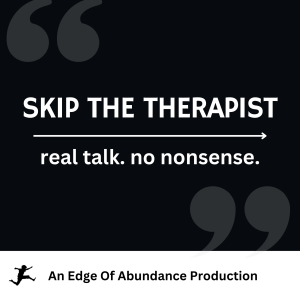

When Hope Feels Lost: Finding Your Way Back to Resilience, Courage, and Commitment
💭 Have you ever felt like the light at the end of the tunnel just… went out? You're not alone. In this powerful and soul-nourishing episode, we dive deep into what to do when hope feels out of reach—those moments when life feels heavy, motivation slips away, and even getting out of bed feels like a battle.
But this isn't about perfection or "quick fixes." It’s about something much more sustainable: resilience, emotional courage, and the quiet, consistent return to your own life—even when it feels impossible.
🔍 We explore:
-
How to recognize the early signs of emotional burnout and despair
-
The psychology of losing hope and why it’s more common than you think
-
Gentle tools to rebuild emotional strength
-
How to shift from surviving to showing up with commitment and self-compassion
-
The role of mindset, mindfulness, and meaningful connection in healing
Whether you're in the thick of a tough season or supporting someone who is, this episode offers real talk, grounded strategies, and an invitation to begin again—not from scratch, but from where you are now.
✨ If you're looking for insight on mental health, navigating hard times, healing from emotional exhaustion, or finding the courage to keep going, this episode is for you.
🎧 Tune in now and rediscover that while hope may flicker, it never fully disappears—it waits patiently to be reignited. And, don't forget to subscribe for life-changing conversations!
EPISODE TAKEAWAYS:
My Top 10 Ways to Deal with Hopelessness:
1. Let Yourself Feel It—Then Name It
The worst thing we can do with hopelessness is pretend it isn’t there. Give yourself space to feel what you’re feeling. Sit with it. Cry. Journal. Scream into a pillow. Then—name it. “This is hopelessness.” “This is grief.” “This is fear.” Naming your emotions gives your brain something to work with. You become an observer instead of a prisoner.
2. Zoom Out: The 10-Year Window
This one always shifts my perspective: ask yourself, Will this matter in 10 years? If the answer is no, breathe. Let it go, even if only in small pieces. If the answer is yes… then you know you’re in something meaningful—and meaningful things are worth the pain and attention they demand. Either way, you win clarity.
3. Get Micro With Your Power
Hopelessness tells you that you’re powerless. But you’re not. You can always influence something. Drink water. Text someone you trust. Change your clothes. Move your body for five minutes. Small actions can rewire your entire nervous system and remind you—you’re still here, and you’re still in charge of your next move.
4. Say It Out Loud to Someone Safe
Don’t underestimate the power of human connection. When you share your struggle—out loud—it stops festering in the dark. Find someone who won’t try to fix it, but who can sit in it with you. Even if it’s just one person. Or… hey, even a therapist or a stranger on a hotline. Speaking truth aloud is an act of courage.
5. Rewrite the Story With “And”
Here’s a mental shift that’s changed my life: Instead of saying, “I’m overwhelmed and I can’t do this,” try… “I’m overwhelmed, and I’m still showing up.” “I feel hopeless, and I’m taking care of myself anyway.” The word “and” lets you be both struggling and strong. Both afraid and brave. It’s never either/or. It’s both/and.
6. Shift Your Focus to What You Can Control
When feeling hopeless, it often feels like everything is out of your control, which fuels negative emotions and despair. However, shifting your attention to small, actionable steps that you can control can create a sense of empowerment. These could be daily habits, small goals, or even how you respond to challenges.
Transformation to Resilience: Focusing on controllable actions builds a sense of autonomy and accomplishment, helping you regain confidence and hope. This shift in perspective allows you to start moving forward, even if in small ways, which builds momentum toward overcoming larger obstacles.
7. Practice Self-Compassion and Mindfulness
Often, hopelessness is linked to harsh self-judgment, guilt, or regret. Practicing self-compassion involves treating yourself with kindness and understanding, as you would treat a friend in the same situation. Mindfulness techniques, such as deep breathing or meditation, can help center your mind and reduce feelings of overwhelm.
Transformation to Courage: By offering yourself grace and space to feel what you're feeling, you cultivate emotional resilience. Over time, this allows you to face difficulties with a gentler mindset, fostering courage to take the next step without the pressure of perfection or harsh self-criticism.
8. Reframe Negative Thoughts and Limiting Beliefs
Hopelessness often stems from negative thought patterns, such as “I’m not good enough” or “Nothing will ever change.” Reframing these thoughts helps shift your perception of yourself and the situation. Challenge the negative narrative by questioning its validity and replacing it with positive affirmations or realistic thoughts about your potential.
Transformation to Resilience: Reframing teaches you to control your thoughts instead of letting them control you. By consciously choosing a more positive perspective, you build mental strength, rewire your brain to focus on possibilities, and foster a resilient mindset that embraces setbacks as learning experiences.
9. Find Meaning and Purpose in the Struggle
In moments of hopelessness, it can be incredibly helpful to reflect on the deeper meaning or lessons behind your struggles. This can involve considering how overcoming challenges strengthens you or how adversity leads to personal growth and transformation. Often, purpose can be found even in hardship, which can reignite your sense of direction.
Transformation to Commitment: Finding purpose in your journey—whether it’s through helping others, achieving personal growth, or aligning with your values—fuels your determination. It helps you stay committed to your goals because you understand the larger picture and know that every effort counts toward something meaningful.
10. Build a Support System and Seek Guidance
Hopelessness can be isolating, but connecting with others—whether friends, family, mentors, or support groups—can provide perspective, encouragement, and emotional relief. Vulnerably sharing your struggles and seeking guidance not only reduces isolation but also provides wisdom, strength, and reassurance.
Transformation to Courage: Having a strong support network helps you tap into the courage of others when your own feels depleted. Knowing you're not alone in your journey boosts your resilience, provides hope, and reinforces your commitment to push through challenges. You realize that you're part of a collective strength that helps you keep going.
By implementing these strategies you can effectively transform hopelessness into a mindset rooted in resilience, courage, and commitment. Each step you take will gradually empower you to rise above adversity, face challenges with a stronger mental state, and persevere toward your goals.
GROW WITH ME:
Follow me on Facebook, Instagram & YouTube!
JOIN MY EMAIL COMMUNITY FOR EXCLUSIVE CONTENT & OFFERS YOU WON'T GET ANYWHERE ELSE.
Don't forget to leave a comment & review to let me know what you thought of the show today! HERE'S TO YOUR EVOLUTION!
Disclaimer: This podcast is for informational purposes only and should not be considered health or medical advice. We are not responsible for any losses, damages, or liabilities that may arise from the use of this podcast. This podcast is not intended to replace professional medical advice. The views expressed in this podcast by guests may not be those of the host or the management.
More Episodes
All Episodes>>Create Your Podcast In Minutes
- Full-featured podcast site
- Unlimited storage and bandwidth
- Comprehensive podcast stats
- Distribute to Apple Podcasts, Spotify, and more
- Make money with your podcast












